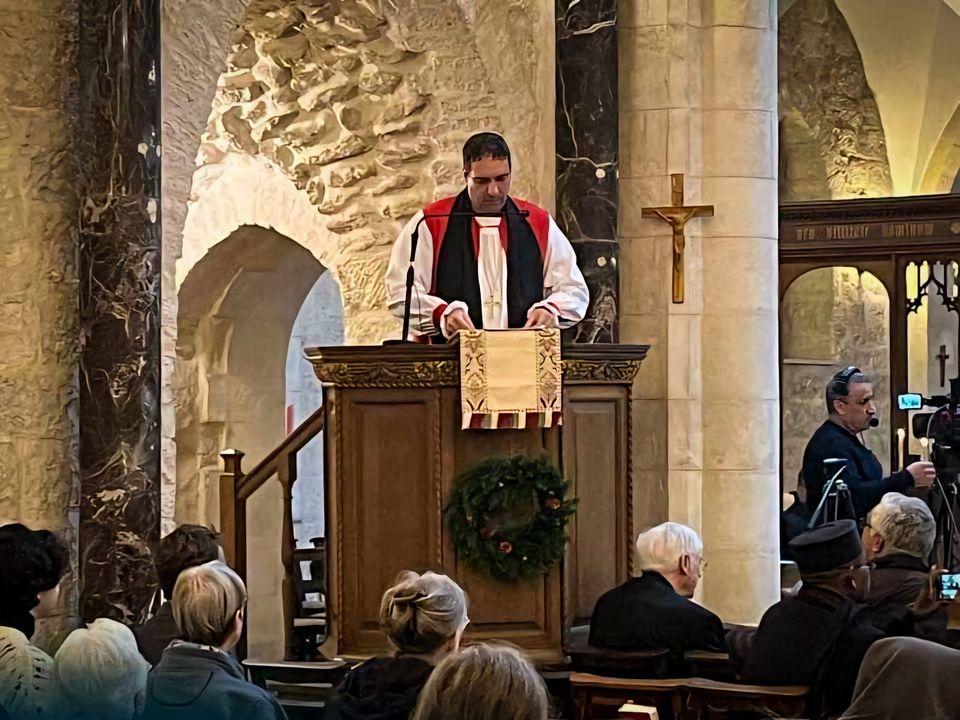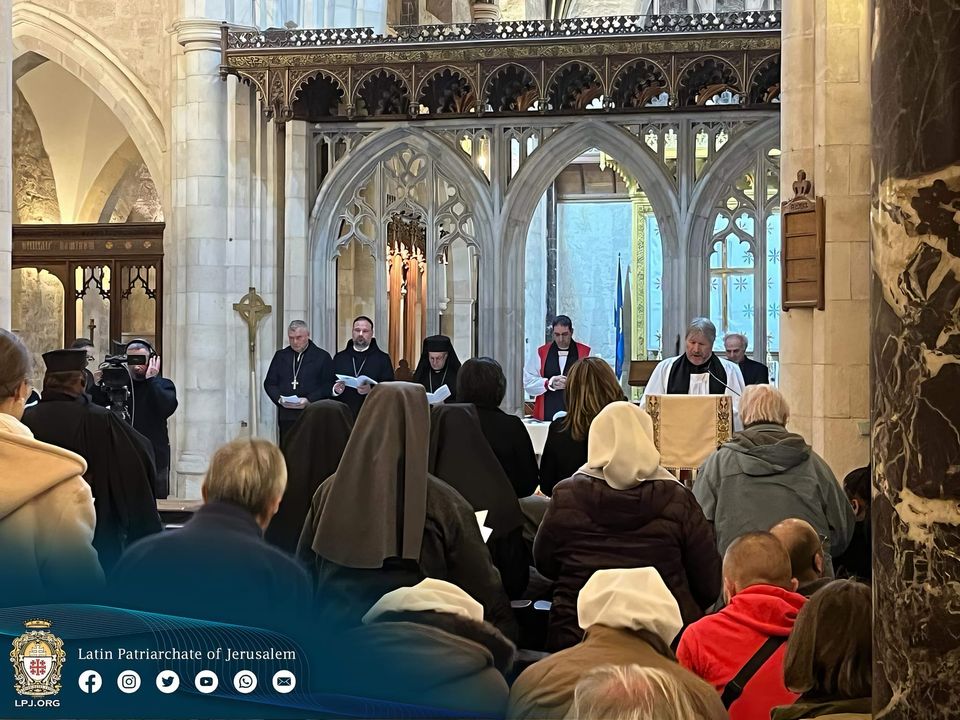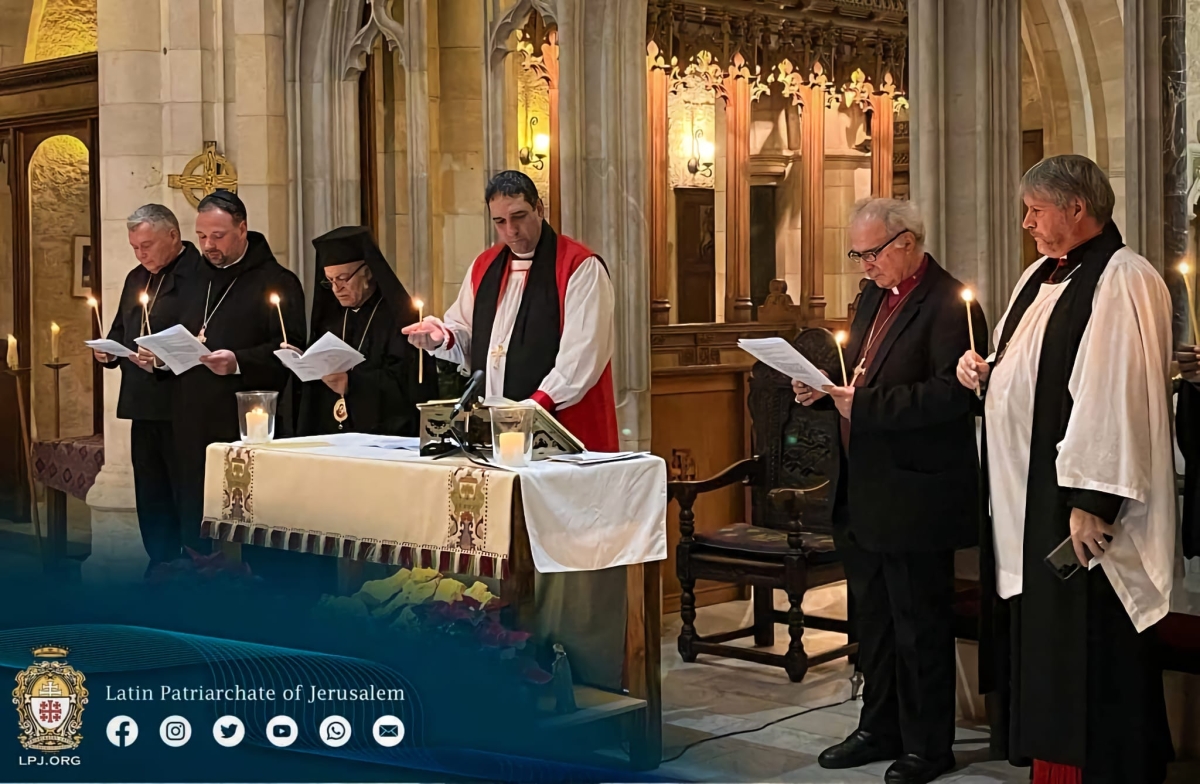A packed St George's Cathedral in Jerusalem was the setting for the second service in a series to mark the Week of Prayer for Christian Unity. Archbishop Hosam was the preacher, and this is what he said.

This year, we gather together for prayer and worship in a time of great crisis. I daresay that the situation surrounding our services this year is more tragic and heart-breaking for all affected parties than any of us have ever experienced in our lives (though I speak only for myself).
Each day, new and horrifying images of death and destruction fill our screens. The scale of the devastation is so vast that it is hard for us to even imagine.
Over the past three months, the war’s ravages have made more people homeless than the entire populations of Jerusalem, Tel Aviv, and Haifa combined. These great throngs of people are now refugees, wandering from place to place, seeking safety for themselves and their children.
Each morning, they rise to search for food and water in order to survive. Thousands among them are severely wounded and still waiting for treatment. Many of those already treated have had their hands or legs amputated. They are now crippled for life and will never function normally again.
Yet these are the lucky ones. They have survived the explosions and sniper fire. They have escaped the collapsing buildings that have left thousands buried beneath the rubble. They have somehow endured the months of no heat, no electricity, no way of communicating with their loved ones. They have also not been among those bound and taken away to imprisonment and an uncertain fate.
Yet whatever their state, most of those still living feel that the world has abandoned them. They do not see an end to the violence and bloodshed. They have lost all hope for any future for themselves or their families.
It is in this extreme context that we gather together for shared worship this evening and throughout this Week of Prayer for Christian Unity.

The theme verse for this year’s ecumenical observance is well known to us. It is Jesus’ Summary of the Law. Our Lord gave it in response to the Lawyer’s question, “What must I do to inherit eternal life?”
Most of us know the answer to this question by heart: “You shall love the Lord your God with all your heart, and with all your soul, and with all your strength, and with all your mind; and your neighbor as yourself” (Luke 10:27)
The lawyer did not take issue with the first part of this summary, since it is found in the Shema’ that he recited twice a day. However, the man did question the second part. He asked, “And who is my neighbor?”
To this, Jesus answered with the Parable of the Good Samaritan. This is also a story we all know by heart.
And one of the interesting things about this parable is that it first presents us with a man in crisis. This unnamed victim is beaten, robbed, and left for dead on the side of the road. Without immediate treatment, he will surely die.
Now, as the parable unfolds, Jesus poses to us many unspoken questions. One of them is this: If I were to encounter this man on the side of the road, how would I respond?
My friends, because of this war, we do not have just one person dying on the side of the road. We have thousands. In fact, we have tens and even hundreds of thousands who may soon die, if they do not receive immediate relief.
And so for us this year, Jesus’ commandment to love God and love your neighbor as yourself is not an abstract concept. It is not some theoretical idea to be debated in the seminary classroom. It is literally a matter of life and death.
This year more than ever, it is a commandment that we, as the Body of Christ, must heed.
In this regard, there are many heroes of the faith.
Some of them are the staff and volunteers at our al-Ahli Arab Hospital in Gaza. Under great hardship, with bombardments constantly around them, they have worked night and day to bring God’s healing love to the patients brought to them.
By a great miracle, the hospital has never closed. For only three days was it kept from receiving new patients. Even then, the staff continued treating those inside, many of them laid out upon the pews of St. Philip’s Chapel.
But they are not the only heroes. So also are the clergy and lay leaders of St. Porphyrios and Holy Family Churches. At great risk, they have given sacred refuge to nearly the entire remaining Christian population in Gaza.
And even as they worked to provide food and water to the people under their care, they continued to lead worship throughout the Advent and Christmas seasons—and now beyond.
Together, these form a great ecumenical witness to God’s redeeming love in the midst of the disasters of war—a sea of flickering candles, shining forth the light of Christ in the midst of the surrounding darkness.
We, as the larger Body of Christ, must continue to do everything we can to support them and the thousands of others who are working to care for their neighbors.
As Christians, we must more and more come together in unity of prayer, unity of deed, and unity of love. Only in this way can we continue Christ’s mission of “bringing good news to the oppressed, binding up the brokenhearted, proclaiming liberty to the captives, and release to the prisoners” (Isaiah 61:1; Luke 4:18-19).
Only in this way can we begin to fulfill Christ’s commandment to love God by loving our neighbors as ourselves.
Only in this way, can we begin down the pathway leading towards a just and lasting peace here in the very land of our Lord’s birth.
My Brothers and Sisters in Christ, tonight, let us begin that journey together. Amen.

Published 22nd January 2023
